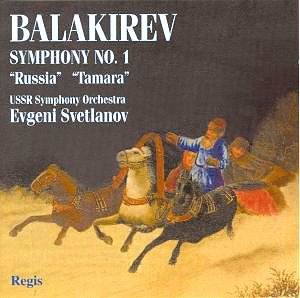Balakirev's dedication to folk music and the
exotic orient is well known. Both influences put in appearances
to greater or lesser extents in all three works.
The First Symphony has attracted several
celebrity recordings over the years. I have Karajan's and Beecham's
EMI discs in mind. These two (often reissued) have tended to discourage
competition until comparatively recently. I know the Beecham and
rate it highly. I have not heard the Karajan/Philharmonia (mono).
Beecham, with his Ballets Russes background sweeps the board but
this Svetlanov is lingeringly seductive. The acid test is the
oriental song of the third movement which foreshadows Rimsky's
Antar and Sheherazade as well as the dashing light-as-down
Scherzo. The other movements are equally elastic and responsive
to the strange poetry of the Eastern Ďnever-never landí of a Thousand
and One Nights.
Throughout these works Svetlanov blends steely
control, foot-tapping rhythmic definition and a yielding way with
melody. He also has the ineffable virtue of the sound of a 1970s
vintage Russian orchestra: an edgy and weighty string choir, piercing
trumpets (recorded unflinchingly without a momentís distortion
- try 3.46 on tr.2), liquid horns (not as extreme as Golovanovís
on the late-lamented Boheme label), lushly spotlit harp (12.40
tr.3), obsidian and lignite brass (6.01 tr.4) and peasant-toned
woodwind (4.12 tr.5 in Russia).
Tamara predictably attracted Leon
Bakst for production as a ballet. It has all the desired qualities.
It is death-centred with large helpings of seduction, deceit,
violence and eroticism. At over 21 minutes Tamara is both the
most famous and most substantial of Balakirevís works. It was
written after three trips to the Caucasus: 1862, 1863 and 1868
and was finished in 1882. The storyline is based on Mikhail Lermontovís
tale of Tamara the temptress, half angel, half demon, who seduces
passing travellers. After a night of orgiastic pleasure she then
murders them and flings their bodies into the River Terek - rumbling
like a malign Vltava in the first few moments and foreshadowing
Sibeliusís Lemminkainen in Tuonela. The violence is vivid,
but the most immediate impact is in the sensuous abandon woven
into the gem of a main theme presented in swaying strings. Svetlanov
gives free rein to every element of the fantasy - just listen
to the side-drum accompanied dance. The work has a symphonic symmetry.
It is not difficult to see it as a single movement symphony. The
symphonic poem Russia (Rus) is quite low key, more
a Russian rhapsody than a symphonic conception. It has its moments.
The Hyperion two CD set of the two symphonies
is at mid-price (this may now have migrated to Helios in individual
discs) and is attractive with recordings dating from the early
1980s. The Philharmonia conducted by Svetlanov have however opened
the door to a certain languor and the timings for all the works
are longer than those for this Regis disc.
If you donít know Balakirevís music then think
in terms of the orchestral music of Borodin and Rimsky-Korsakov
and you wonít go far wrong.
I hope that Regis will be able to negotiate licences
from Gramzapis/CDK Music for the majority of Svetlanovís Russian
Symphonic series - some of which were previously issued on Harmonia
Mundi. This series includes his 1970s Tchaikovsky symphonies including
a terrifying Manfred. If Regis are unable to license Svetlanovís
complete Glazunov symphonies they would do well to examine the
Fedoseyev cycle or the 1960s one-offs (3, 4, 5, 6, 8) by Boris
Khaikin, Nathan Rakhlin or Konstantin Ivanov. Rozhdestvenskyís
version of the symphonies, once to be had on Olympia, would not
be the best choice. The Fedoseyev was available as a boxed set
of Eurodisc LPs circa 1982.
Glowing performances of works imbued with magical
fantasy superbly recorded in all their gaudy finery and transferred
without degradation. What more could you reasonably ask? This
is a staggering bargain in the same price range as the Naxos series.
Rob Barnett
